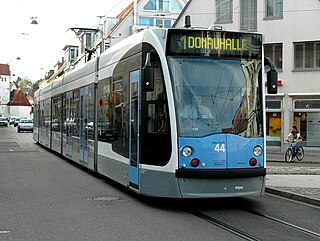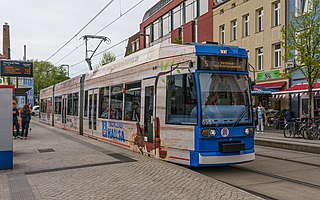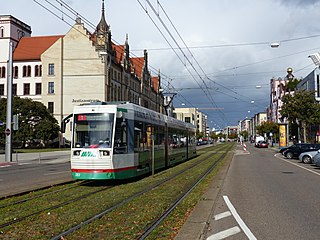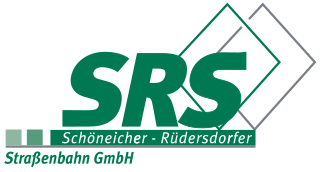
Stadtbahn is a German word referring to various types of urban rail transport. One type of transport originated in the 19th century, firstly in Berlin and followed by Vienna, where rail routes were created that could be used independently from other traffic.

Germany has an extensive number of tramway networks. Some of these networks have been upgraded to light rail standards, called Stadtbahn in German. Straßenbahn and Stadtbahn schemes are usually operated on the legal foundation of the BOStrab, the Tramways Act of Germany.

Tatra KT4 is the name of a four-axle type articulated tramcar developed by the Czech firm ČKD Tatra. The first pre-production vehicles entered service in Potsdam in 1975, with the first production vehicles in 1977. A total of 1,747 units were built, with initial deliveries to East Germany (DDR) and later to the USSR and SFR Yugoslavia. KT4 variants were built for both standard gauge and metre gauge tramways. Production of the KT4 tramcar was halted in 1991 due to worldwide economic and political changes at the time. Production was briefly resumed in 1997 to construct the last 20 units for Belgrade, Serbia.

The Potsdam tramway network is a network of tramways forming part of the public transport system in Potsdam, the capital city of the federal state of Brandenburg, Germany.

The Ulm tramway network is a network of tramways forming part of the public transport system in Ulm, a city in the federal state of Baden-Württemberg, Germany.

The Düsseldorf tramway network is a network of tramways serving Düsseldorf, the capital city of the federal state of North Rhine-Westphalia, Germany. In combination with the Düsseldorf Stadtbahn and Rhine-Ruhr S-Bahn, it forms the backbone of the public transport system in Düsseldorf.

The Würzburg tramway network is a network of tramways forming part of the public transport system in Würzburg, a city in the federal state of Bavaria, Germany.

The Frankfurt (Oder) tramway network is a network of tramways forming part of the public transport system in Frankfurt (Oder), a town in the federal state of Brandenburg, Germany, on the Oder River, at the German-Polish border.

Škoda ForCity is a family of low-floor trams built by Škoda Transportation. This includes Finnish-made Artic trams branded as ForCity Smart. ForCity trams have been ordered by transport companies in Bonn, Bratislava, Chemnitz, Eskişehir, Espoo/Helsinki, Heidelberg/Ludwigshafen/Mannheim, Konya, Miskolc, Ostrava, Prague, Riga, Schöneiche and Tampere. As of February 2021, 823 units had been ordered.

The Schwerin tramway network is a network of tramways forming the key feature of the public transport system in Schwerin, the capital city of the federal state of Mecklenburg-Vorpommern, Germany.

The Rostock tramway network is a network of tramways forming the centrepiece of the public transport system in Rostock, the largest city in the federal state of Mecklenburg-Vorpommern, Germany.

The Brandenburg an der Havel tramway network is a network of tramways forming the centrepiece of the public transport system in Brandenburg an der Havel, a city in the federal state of Brandenburg, Germany.

The Chemnitz tramway network is a network of tramways forming the centrepiece of the public transport system in Chemnitz, a city in the federal state of Saxony, Germany.

The Essen tramway network is a 52.4-kilometer (32.6 mi) network of tramways forming part of the public transport system in Essen, a city in the federal state of North Rhine-Westphalia, Germany. Parts of the system also serve the neighbouring city of Gelsenkirchen.

The Görlitz tramway network is a network of tramways forming part of the public transport system in Görlitz, a city in the federal state of Saxony, Germany.

The Zwickau tramway network is a network of tramways forming part of the public transport system in Zwickau, a city in the federal state of Saxony, Germany.

The Dessau tramway network is a network of tramways forming part of the public transport system in Dessau-Roßlau, a city in the federal state of Saxony-Anhalt, Germany.

The Magdeburg tramway network is a network of tramways forming part of the public transport system in Magdeburg, the capital city of the federal state of Saxony-Anhalt, Germany.

The Naumburg (Saale) tramway is a tramline forming part of the public transport system in Naumburg (Saale), a city in the federal state of Saxony-Anhalt, Germany. At only 2.9 km (1.8 mi) long, it is the smallest urban tramway in Germany, and one of the smallest in Europe.

The Schöneiche bei Berlin tramway is an interurban tramway running from Friedrichshagen S-Bahn station to the towns of Schöneiche bei Berlin and Rüdersdorf, to the east of Berlin.























